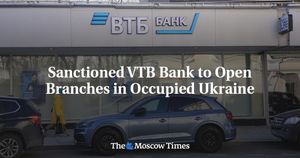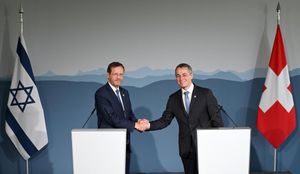Arte's upcoming broadcast of Charlie Wilson's War sets the stage for renewed discussion on U.S. foreign policy as the film delves deep not only within the confines of political maneuvering but also mirrors contemporary issues with its unique and humorous storytelling.
Scheduled for February 9, 2025, at 21:00, the film, directed by Mike Nichols and starring renowned actors Tom Hanks and Julia Roberts, outlines the riveting true story of former Texas Congressman Charlie Wilson’s strategies during the Soviet invasion of Afghanistan. Wilson, portrayed by Hanks, transforms from a notorious party-lover known as 'Good Time Charlie' to one of the key players advocating for U.S. support to the Afghan mujahideen.
Originally inspired by the book by George Crile, published in 2003, Charlie Wilson's War reveals Wilson's deep-seated motivations to confront the USSR’s dominance, raising questions about how personal interests intersect with national priorities.
Mike Nichols, both the director responsible for the film’s flair and intelligence, stated, 'He is courteous, amiable, thoughtful, and remarkably frank. He’s the only politician I know who refuses to give the runaround and speaks to you spontaneously.' His portrayal of Wilson’s character captures the essence of American politics as it was during his tenure.
The film details Wilson's inventive strategies for securing funding and military support. With the assistance of anti-communist billionaire Joanne Herring (played by Julia Roberts) and CIA agent Gust Avrakotos (Philip Seymour Hoffman), Wilson successfully maneuvered the American government to escalate its involvement which would significantly alter the balance of power during the Cold War. 'My opponents can say what they like, but they cannot deny we passed more measures for Medicare than anyone else,' said Wilson, highlighting how he managed to blend his political legacy with personal flamboyance.
Throughout the film, audiences witness Wilson’s audacity and charm as he strategically promoted increasing U.S. aid to Afghan fighters from $5 million to $1 billion. With such funding, the mujahideen gained weapons, including Stinger missiles, which effectively challenged Soviet troops. The emphasis on the humorous yet serious repercussions of this support would be hard to overlook—it's projecting the unintended consequences of U.S. foreign intervention on global politics.
Hanks encapsulated the essence of Wilson by declaring, 'Charlie Wilson is the Mick Jagger of politics!' - illustrating the magnetic personality and wild legacy of the real-life congressman.
Of note, the film also draws attention to the period's political dynamics. By aiding the mujahideen, Wilson contributed to significant shifts during the Cold War, leading to eventual Soviet withdrawal from Afghanistan. But as the film deftly indicates through initial successes, these actions would lead to complex repercussions, including the rise of extremist factions post-Soviet exit.
Listeners and viewers should prepare for reflection on the nature of American interventionism, echoing sentiments of historical perspectives repackaged through engaging narratives. At the end of the day, Nichols’ film doesn't just serve as entertainment but also as history, with salient lessons embedded.
Culminatively, the cultural impact of Charlie Wilson's War remains significant today. The narrative continues to spark debate about ethical foreign policy and the age-old question: Does intervention do more harm than good? Arte's forthcoming airing presents the chance for audiences to reflect on not only the exhilarating twists of the narrative but on how it connects with current geopolitical realities.
Viewers can expect to be entertained and educated, shaping their perspectives on the repercussions of decisions made years ago, echoing the claim often attributed to the President of Pakistan at the time when the Russians retreated, 'It's Charlie who did it!' The evening promises not only laughter but contemplation.



